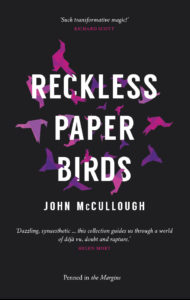
I needed the God of my childhood to be useful
so I folded him, shaped his pages into wings.
Cranes at first, then more challenging roosters,
swallows, owls. I pinched edges, split clauses
to make word plumage. I fractured Leviticus
into pleats. […]
I bought Reckless Paper Birds, John McCullough’s third collection, after opening it at random and reading those magical lines, the opening of the poem ‘Flock of Paper Birds’. I’ve bought poetry collections based on a single poem in the past and been disappointed by the rest of the book, but not in this case. These poems are wonderful – surprising and tender, and with a knack of piercing directly but delicately to the heart of issues including homophobia, mental health and homelessness.
Birds flock throughout, as might be expected. Some poems are named for them: in ‘Jay’ an ‘ice blue flash of wings’ swoops through a reflection on the ordinary domestic details of life, in ‘Pelican’ anxiety is imagined as a giant beak, held out in front of the body and smacking into things. And then there are the numerous small hints of flight, A robin that builds its nest in a discarded trainer, a cricket ball that comes to rest and nestles in a palm. The birds of the title appear in the poem ‘Tender Vessels’, an exquisite poem about the dangers inherent in being an openly gay man, even in a place as tolerant as Brighton where many of these poems are set. ‘History won’t take its mouth off my body’ remarks the speaker of the poem, who weaves through crowds, witnessing acts of violence one minute, tenderness the next. His connection with each man he sees, and those populating history behind him, binds them all together into a flock of reckless paper birds, speeding through the air – vulnerable yes, but defiant and joyful with it.
Joy repeatedly answers the troubling moments of this collection. The poems can turn on a heartbeat and we are reminded that while happiness and security can be fragile, so too are painful moments. In the beautiful poem ‘Soulcraft’, depression sends the flickering soul-light to ground, but in a moment – ‘I’m only eased by accident’ – the situation is reversed and the soul ‘glides to my surface / like it, too, belongs there, like a bright fish rising to feed.’ Again, at the end of the poem ‘Pelican’, the sound of a lover’s hello baby over the phone is enough to flip the moment from anxiety to tenderness.
McCullough moves effortlessly from one seemingly random subject to the next, from Lady Gaga, to silkworms, to My Little Pony, but this collection is far from incohesive. These poems are proof that anything can be a conduit for delight if we pay attention, and that while life may be unpredictable and difficult, the desire to continue living is strong. In ‘Stationery’:
Love is horrific like that. First it’s a rabbit, then a duck,
then it’s a ravenous, one-eyed sock puppet;
but the rest is yogurt adverts.
The speaker in the poem is asked: ‘do you wish to continue‘ and the answer is:
[…] ‘Yes, yes I do.
Between the shops, the sea snuggles under its blue leaves.
The clock tower waits patiently for Christmas,
a familiar figure below it waggling his arms
to lure me over. Succeeding. Your skilful face punches
a giant hole in the day and I jump through it.
The exuberance of close connection expressed in that last line feels almost divine, and is only one of many such moments in this collection. I have returned to these poems again and again over the last few weeks and urge you to explore them for yourself. McCullough has given us something truly remarkable.
Reckless Paper Birds is published by Penned in the Margins (2019).